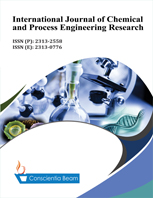Comparative Analysis of Osmotic Dehydration of Fruits and Vegetables: Using Mango (Mangifera Indica L.) and Carrot (Daucus Carota L) in a Semi-Continuous Process
DOI:
https://doi.org/10.18488/journal.65.2017.41.1.12Abstract
Fruits and vegetables are important part of human diet but are prone to rapid deterioration. Osmotic dehydration (OD) is a method capable of retaining nutrient and organoleptic qualities of preserved food and aid drying at reduced energy requirement for minimally processed food. The study is aimed at analysing and comparing OD of fruits and vegetables using mango (Mangifera indica L.) and carrot (Daucus carota L) as case samples. The effects of sucrose concentration, residence time and temperature of OD media were investigated for water loss (WL) and solute gain (SG) regression. Optimal transport models established for maximum WL and minimum SG at 40-60 oBx, 30-50 oC and 0-180min using Modified Distance Design of the response surface methodology Design Expert 6.0 achieved 46.87% WL and 7.33% SG for mango and 36% WL and 5% SG for carrot. At the optimized conditions of in a semi-continuous process it was observed that high SC did not favour WL in mango while in carrot, increased SC resulted in a consistent increase in WL. The analysis of variance revealed R2 of 72.95% for carrot and 98.44% for mango at (P<0.05) thus showing the effects of the plant morphology on OD process effectiveness in determining the order of processing fruits and vegetables in a semi-continuous process.

